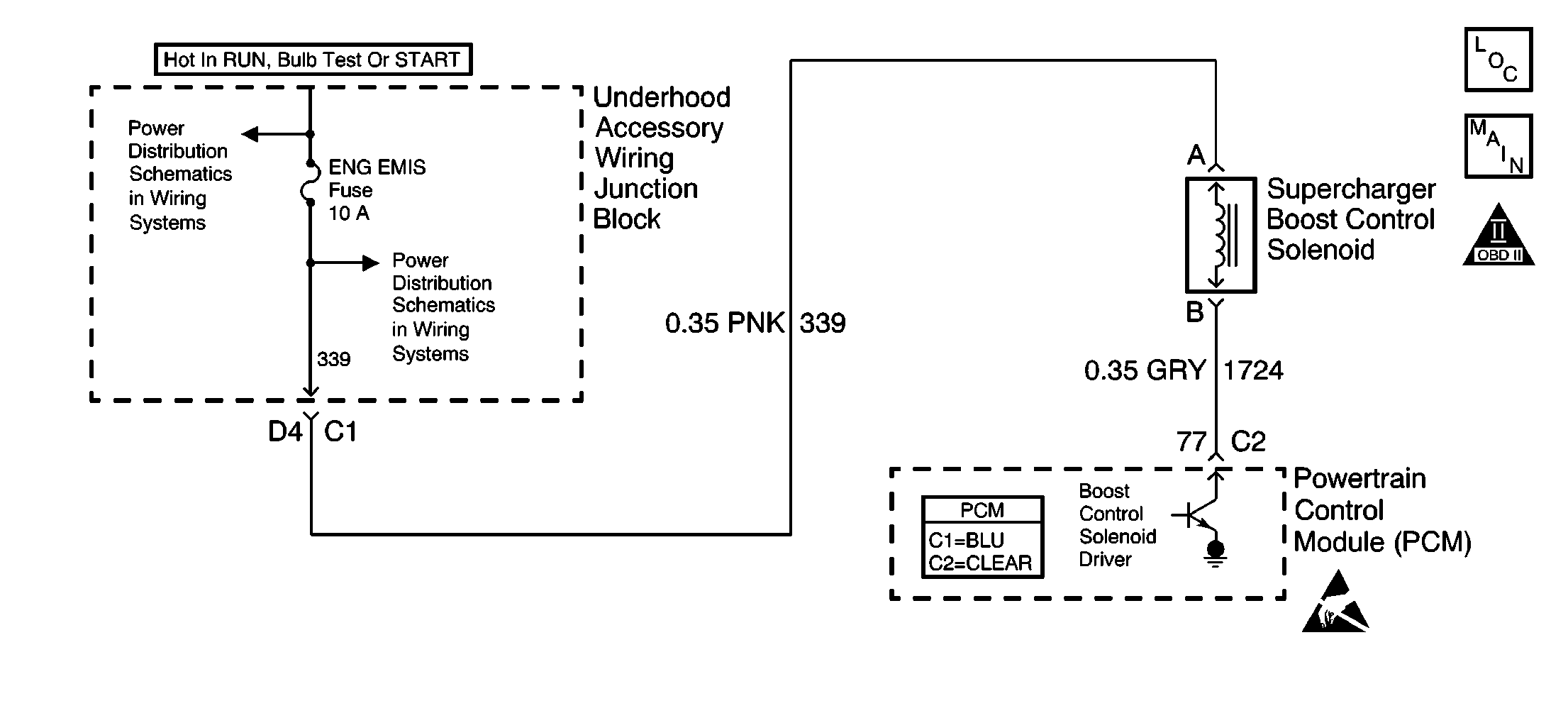
Circuit Description
Output driver modules (ODMs) are used by the powertrain control module (PCM) to turn ON many of the current-driven devices that are needed to control various engine and transaxle functions. Each ODM is capable of controlling up to 7 separate outputs by applying ground to the device which the PCM is commanding ON. Unlike the quad driver modules (QDMs) used in prior model years, ODMs have the capability of diagnosing each output circuit individually. DTC P0243 set indicates an improper voltage level has been detected on the supercharger boost control solenoid control circuit.
Conditions for Setting the DTC
| • | The ignition is ON. |
| • | An improper voltage level has been detected on the Boost Control solenoid control circuit. |
| • | The above conditions are present for at least 30 seconds. |
Action Taken When the DTC Sets
| • | The PCM will not illuminate the malfunction indicator lamp (MIL). |
| • | The PCM will store conditions which were present when the DTC set as Failure Records data only. This information will not be stored as Freeze Frame data. |
Conditions for Clearing the MIL/DTC
| • | A History DTC will clear after 40 consecutive warm-up cycles have occurred without a malfunction. |
| • | The DTC can be cleared by using the scan tool Clear Info function. |
Diagnostic Aids
Check for the following conditions:
| • | Poor connection at the PCM or the boost control solenoid -- Inspect harness connectors for: |
| - | Backed out terminals |
| - | Improper mating |
| - | Broken locks |
| - | Improperly formed or damaged terminals |
| - | Poor terminal to wire connection |
| • | Damaged harness -- Inspect the wiring harness for damage. |
| • | If the harness appears to be OK, disconnect the PCM, turn ON the ignition and observe a voltmeter connected between the boost control solenoid control circuit and ground at the PCM harness connector while moving connectors and wiring harnesses related to the boost control solenoid. A change in voltage will indicate the location of the malfunction. |
Reviewing the Failure Records vehicle mileage since the diagnostic test last failed may help determine how often the condition that caused the DTC to be set occurs. This may assist in diagnosing the condition.
Test Description
The numbers below refer to the step numbers on the diagnostic table.
-
Normally, ignition feed voltage should be present on the control circuit with the PCM disconnected and the ignition turned ON.
-
This step checks for a shorted component or a short to B+ on the control circuit. Either condition would result in a measured current of over 800 milliamps. Also checks for a component that is going open while being operated, resulting in a measured current of 0 milliamps.
-
This step checks for a short to voltage on the control circuit.
-
This vehicle is equipped with a PCM which utilizes an Electrically Erasable Programmable Read Only Memory (EEPROM). When the PCM is being replaced, the new PCM must be programmed.
Step | Action | Values | Yes | No | ||||||
|---|---|---|---|---|---|---|---|---|---|---|
1 | Did you perform the Powertrain On Board Diagnostic (OBD) System Check? | -- | ||||||||
Is voltage near the specified value? | B+ | |||||||||
Does the current reading remain between the specified values? | 0.05-0.8 Amps (50-800 mA) | |||||||||
Is voltage at the specified value? | 0 V | |||||||||
5 | Locate and repair short to voltage in the boost control solenoid control circuit. Refer to Wiring Repairs in Wiring Systems. Is the action complete? | -- | -- | |||||||
6 |
Is the fuse blown? | -- | ||||||||
7 |
Is the action complete? | -- | -- | |||||||
8 |
Is voltage near the specified value? | B+ | ||||||||
9 |
Did you find and correct the condition? | -- | ||||||||
10 |
Did you find and correct the condition? | -- | ||||||||
11 |
Does the test lamp flash ON and OFF? | -- | Go to Diagnostic Aids | |||||||
12 |
Did you find and correct the condition? | -- | ||||||||
13 | Locate and repair open in the ignition feed circuit to the boost control solenoid. Refer to Wiring Repairs in Wiring Systems. Is the action complete? | -- | -- | |||||||
14 | Replace the boost control solenoid. Refer to Boost Control Solenoid Replacement . Is the action complete? | -- | -- | |||||||
|
Important:: The replacement PCM must be programmed. Replace the PCM. Refer to Powertrain Control Module Replacement/Programming . Is the action complete? | -- | -- | ||||||||
16 |
Does the scan tool indicate DTC P0243 failed this ignition? | -- | System OK |
